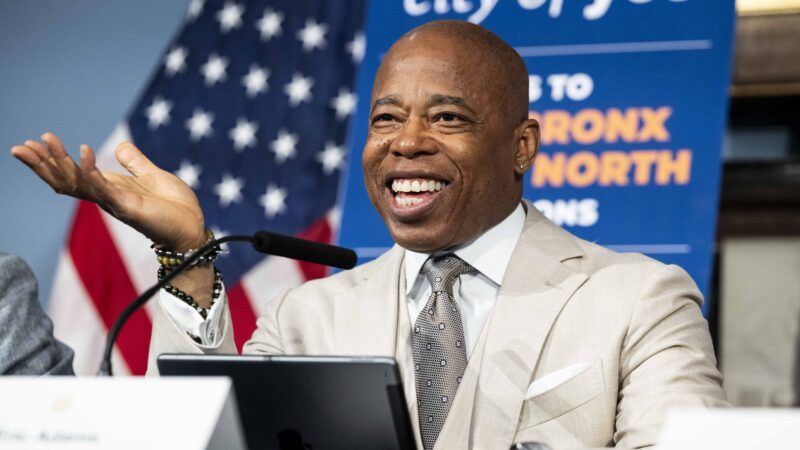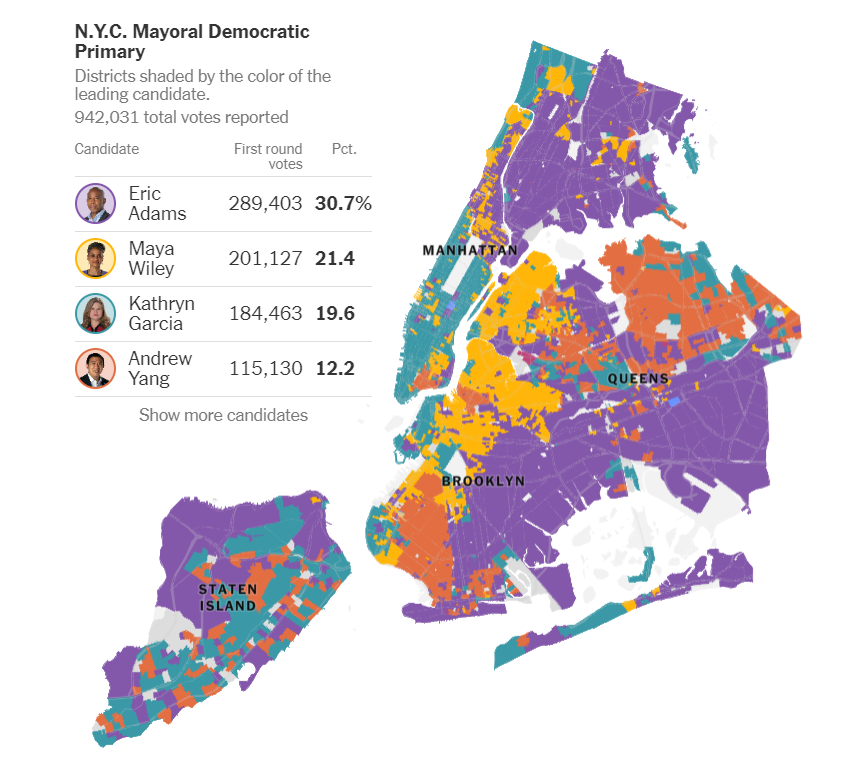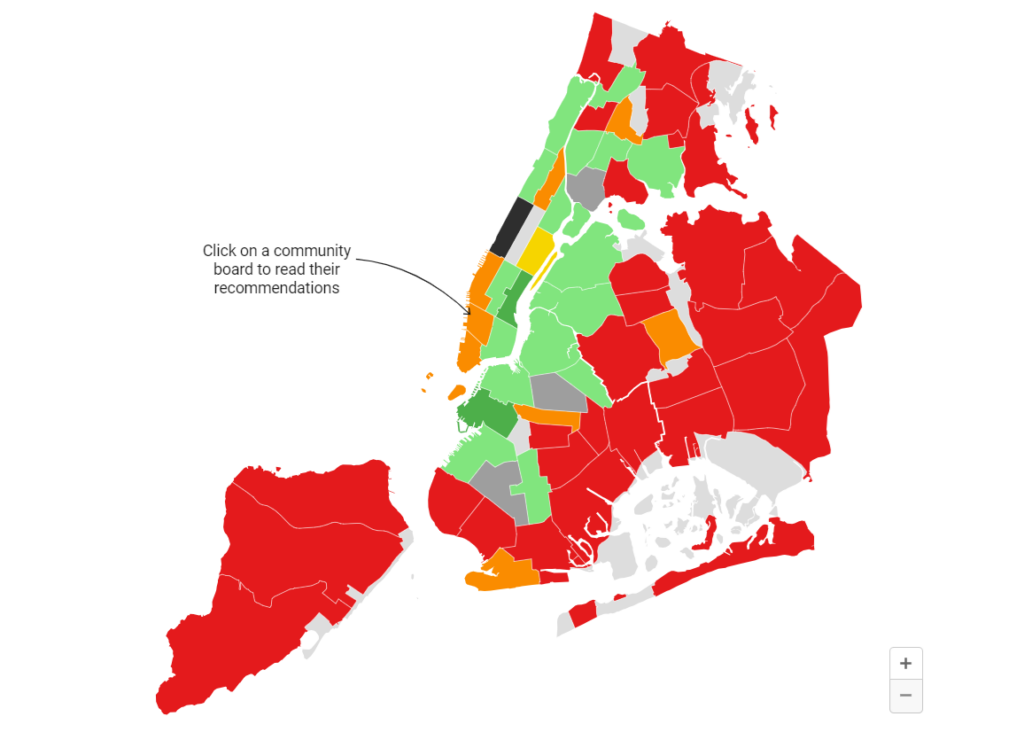Could Eric Adams' Corruption Charges Sink His Signature Zoning Reform?
The New York City Council takes up the mayor's City of Yes for Housing Opportunity reform package the same day Adams is indicted on federal corruption charges.

Yesterday was a momentous day in the politics of New York City.
That afternoon, the City Planning Commission voted 10-3 to approve a suite of zoning reforms championed by Mayor Eric Adams to eliminate parking requirements, allow accessory dwelling units (ADUs) in residential areas, and permit larger residential projects on commercial lots and near transit stops.
The Mayor's City of Yes for Housing Opportunity package, as it's called, now goes to the New York City Council, which now has 50 days to review, amend, and vote on the reforms.
That's some tricky timing given yesterday's other big news coming out of New York City.
A few hours after the planning commission's vote, Adams was indicted on federal corruption charges for allegedly accepting free travel, luxury accommodations, and illegal campaign contributions from Turkish business people and government officials.
So, in short, the city council will be considering Adams' signature land use reform at the same time that the mayor will be facing federal corruption charges and mounting calls for him to resign.
Even before the mayor's indictment, City of Yes faced an uncertain future at the city council, says Alex Armlovich, a senior housing policy analyst at the Niskanen Center.
"This is the first time that [city councilmembers] are going to be engaging with a citywide upzoning with different characteristics than any other small area upzoning," says Armlovich.
That offers the opportunity to change some minds of councilmembers who are typically hostile to individual development proposals, says Armlovich. It also opens up the risk that council members will try to water down the City of Yes reforms, especially around parking and ADUs.
The mayor has a significant role to play in the process, both politically and procedurally.
On the political side of things, Armlovich notes that Adams' base of supporters is concentrated in the areas of the city that have been most opposed to his own housing reforms.
Compare the two maps below. This top one, from The New York Times, shows how the city's mayoral candidates performed at the district level in the 2021 Democratic primary that Adams won.

The bottom one, from City Limits, shows how local community boards voted on Adams' City of Yes for Housing Opportunity.

The mayor's personal popularity in those areas is an asset in winning over city council members who might otherwise be tempted to vote against the City of Yes. But if Adams' indictment makes him politically toxic, his ability to whip reluctant votes is much diminished.
Procedurally, the mayor has the power to veto land use changes approved by the city council. (The city council can override that veto with a two-thirds vote).
Since City of Yes is Adams' baby, he obviously wasn't going to veto it.
Should he resign, he'll be replaced by New York City Public Advocate Jumaane Williams, who'll then have 90 days to schedule a special election.
Willams has been equivocal in his support for City of Yes.
When asked about the plan by reporter Ben Max during a May podcast interview, Willams said that "in theory, I've been leaning yes from the beginning" adding that "we can't stop the progress of building in the housing crisis that we're in."
In the same interview, Willams also said that community fears about development should be taken seriously, and that "black, brown, [and] poor neighborhoods" shouldn't have to bear the brunt of new development. He signaled that he'd be willing to accept preserving some areas in exchange for density elsewhere and that new density allowances should be paired with housing affordability mandates.
None of Williams's comments imply that he would veto City of Yes. But it does sound like he'd be willing to tolerate (or even push for) the city council watering down the proposal.
Already, City of Yes for Housing Opportunity is an exceedingly modest response to the scale of New York's housing problems. Adams has described it as a "little more housing in every neighborhood" and everyone seems to think that's an accurate description.
The plan "should push NYC's permits for new housing units meaningfully higher than would have been the case, had the legislature not acted," wrote the Manhattan Institute's Eric Kober in a recent brief. "However, housing will remain in critically short supply in the city."
If the city council waters down the existing plan even more, say by preserving parking mandates, ditching ADUs, or upping affordability requirements, then City of Yes will produce even less housing still.
There's an irony in the fact that Adams' own corruption charges threaten his signature zoning reforms. Underlying the entire City of Yes is the idea that more types of development should be "by-right"—meaning the builders of that housing shouldn't need to ask for discretionary government approval to move forward with their projects.
Giving government officials the ability to approve or deny individual development applications, where millions of dollars are at stake, is itself a major source of corruption.
The federal indictment of Adams accuses him of speeding up the issuance of an occupancy permit for a Turkish government building. A New York Times story from last month about the startling number of corruption cases coming out of California places a lot of city councilmembers' power over individual projects.
A more by-right system, where the rules are written down and projects that meet those rules are automatically approved gives politicians a lot less power to sell.
Adams alleged corruption could end sinking a zoning reform plan that would reduce future opportunities for corruption in New York City.
Rent Free is a weekly newsletter from Christian Britschgi on urbanism and the fight for less regulation, more housing, more property rights, and more freedom in America's cities.


Show Comments (38)